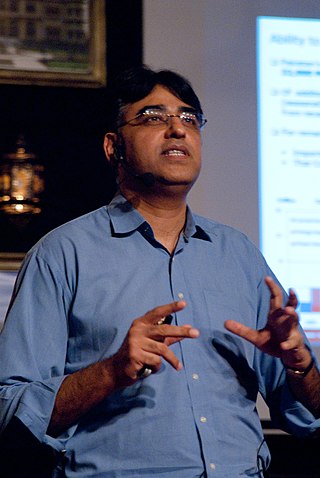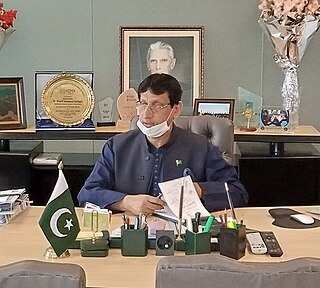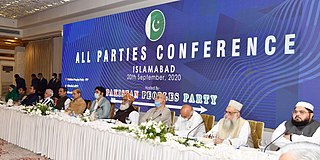
Imran Ahmad Khan Niazi is a Pakistani politician and former cricketer who served as the 22nd prime minister of Pakistan from August 2018 until April 2022. He is the founder and former chairman of the political party Pakistan Tehreek-e-Insaf (PTI) from 1996 to 2023. He was the captain of the Pakistan national cricket team throughout the 1980s and early 90s.

Chaudhry Pervaiz Elahi is a Pakistani politician who is the former Chief Minister of Punjab. He was a member of the Provincial Assembly of the Punjab from August 2018 till January 2023, when he, as chief minister, dissolved the assembly. In 2023, he left the Pakistan Muslim League (Q) and joined Pakistan Tehreek-e-Insaf (PTI) along with his son, Moonis Elahi, and 10 other former PML(Q) MPAs over political rifts with the party president and cousin, Chaudhry Shujaat Hussain. He was appointed president of the PTI. He was the former president of the Punjab Division of the PML(Q).

Shahram Khan Tarakai is a Pakistani politician who was Provincial Minister of Khyber Pakhtunkhwa of Local Government, Elections and Rural Development, in office from 29 August 2018 till 26 January 2020. He had been a member of the Provincial Assembly of Khyber Pakhtunkhwa from August 2018 till January 2023.
Mian Ghulam Sarwar Khan is a Pakistani politician who was the former Federal Minister for Aviation, in office from 24 May 2019 to 10 April 2022. Prior to this position, he was appointed as Federal Minister for Petroleum on 20 August 2018, but he was shifted to the Aviation Ministry. He had been a member of the National Assembly of Pakistan, from August 2018 till January 2023. Previously, he was a member of the National Assembly from 2002 to 2007 and again from June 2013 to May 2018. He remained a member of the Provincial Assembly of the Punjab from 1985 to 1996. Then he

Asad Umar is a Pakistani politician who had been a member of the National Assembly of Pakistan from September 2013 till May 2018 and again from August 2018 to January 2023. He served as the Federal Minister for Planning, Development, Reforms and Special Initiatives, from 19 November 2019 to 10 April 2022.

Asad Qaiser is a Pakistani politician. He is the former Speaker of the National Assembly of Pakistan, served from August 2018 to April 2022. He had been a member of the National Assembly of Pakistan, from August 2018 till January 2023. Previously, he was the member of the Provincial Assembly of Khyber Pakhtunkhwa from 2013 to 2018 and served as the 14th Speaker of the Khyber Pakhtunkhwa Assembly, from May 2013 to August 2018.

General elections were held in Pakistan on Wednesday, 25 July 2018 to elect the members of 15th National Assembly and the four Provincial Assemblies. The three major parties were Pakistan Tehreek-e-Insaf (PTI) led by Imran Khan, the Pakistan Muslim League led by Shehbaz Sharif and the Pakistan Peoples Party led by Bilawal Bhutto. The PTI won the most seats in the National Assembly but fell short of a majority; the party subsequently formed a coalition government with several smaller parties. At the provincial level, the PTI remained the largest party in Khyber Pakhtunkhwa (KP); the Pakistan Peoples Party (PPP) retained its dominance in Sindh and the newly formed Balochistan Awami Party (BAP) emerged as the largest party in Balochistan. In Punjab, the result was a hung parliament with the Pakistan Muslim League (N) winning the most seats. However, after several independents MPAs joined the PTI, the latter became the largest party and was able to form a government.

The third Nawaz Sharif ministry was formed at noon PKT on 5 June 2013 when Pakistan Muslim League (N) (PML-N) chief Nawaz Sharif became the prime minister of Pakistan for the third time. Sharif successfully led the right-of-centre and conservative PML-N to acquire a simple majority. in the 2013 general election against the leftist Pakistan Peoples Party (PPP) and the centrist Pakistan Tehreek-e-Insaf (PTI).
Mazhar Alam Miankhel is a former Justice of the Supreme Court of Pakistan and a former Chief Justice of Peshawar High Court. He served as judge of Peshawar High Court from 2011 to 2014 and later held the position of Chief Justice of the same court from April 8, 2014, until his retirement on July 13, 2022.

Presidential elections were held in Pakistan on 4 September 2018. The elections saw Arif Alvi of PTI being elected as the 13th President of Pakistan after defeating Fazal-ur-Rehman of MMA and Aitzaz Ahsan of PPP. Although the incumbent President Mamnoon Hussain, whose term was to expire on 9th September 2018, was eligible for re-election, he declined to take part.

Fawad Ahmed Hussain Chaudhry (Urdu: فواداحمد حسین چوہدری is a Pakistani politician and a senior member of Pakistan Tehreek-e-Insaf, who was Federal Minister for Information and Broadcasting, in office since 14 April 2021 to 10 April 2022. On 24 May 2023 announced he is taking "break" from politics.
Qasim Khan Suri is a Pakistani politician. He served as the 19th Deputy Speaker of the National Assembly of Pakistan from 15 August 2018 to 16 April 2022. He had also been a member of the National Assembly of Pakistan from August 2018 till January 2023.

Syed Aminul Haque is a Pakistani politician who had been a member of the National Assembly of Pakistan from August 2018 till August 2023. He served as the Federal Minister of Information Technology and Telecommunication after resignation of MQM(P) Chief Khalid Maqbool Siddiqui.

Sardar Usman Ahmad Khan Buzdar is a Pakistani politician and previously served as Chief Minister of Punjab from 20 August 2018 to 30 April 2022. He had been a member of the Provincial Assembly of Punjab from August 2018 till January 2023 and served as the parliamentary leader for Pakistan Tehreek-e-Insaf (PTI) in the Provincial Assembly of Punjab. Belonging from a Baloch family, he is the Tumandar of the Baloch tribe Buzdar, since April 2019. He served as Tehsil Nazim of Tehsil Tribal Area from 2001 to 2008.

The Imran Khan ministry was the government of Pakistan which was formed by Imran Khan following his successful election as Prime Minister of Pakistan by the National Assembly. The Cabinet had 25 Federal Ministers, 4 Ministers of state and 4 Advisors, most of whom assumed office on 20 August 2018.
The first 100 days of Imran Khan's prime ministership began with his swearing-in ceremony on 18 August 2018 as the 22nd Prime Minister of Pakistan – shortly after the oath-taking of the 15th National Assembly of Pakistan on 13 August, and the elected parliament's vote of confidence for Khan's premiership on 17 August. The 100th day of his prime ministership was 25 November 2018.

The Pakistan Democratic Movement, or PDM, is a coalition of political parties in Pakistan. It was founded in September 2020 as a movement against the prime minister Imran Khan, accusing his regime of poor governance, political victimisation of opponents, and mismanaging the economy and foreign policy. The struggle was also joined by several dissident members of Khan's own party, Pakistan Tehreek-e-Insaf (PTI). On 10 April 2022, the coalition succeeded to oust Khan through a no-confidence motion, after which the PDM formed its own government, choosing the opposition leader Shehbaz Sharif as the country's prime minister.

In April 2022, a no-confidence motion against Imran Khan led to his removal as the prime minister of Pakistan. Based largely on the Westminster system of legislature, the prime minister commands confidence of the majority of the lower house of Parliament, the National Assembly of Pakistan, under clause (2A) of Article 91 of the Constitution. Numerous opposition parties joined forces to file the motion of no confidence against Imran Khan in the National Assembly. It ultimately led to the removal of Khan from office as a majority passed the motion in the Lower House.
The 2022–23 Pakistan political unrest was a series of political crises after the ousting of former Prime Minister Imran Khan through a no-confidence motion in April 2022. The crises began in 2022 when the opposition joined hands and submitted a no-confidence motion against Imran Khan's government in the National Assembly. Prime Minister Imran Khan urged the Pakistani establishment not to stay neutral and play its role to save his government and not let historical rival politicians with alleged corruption charges take over, but the establishment refused.
















